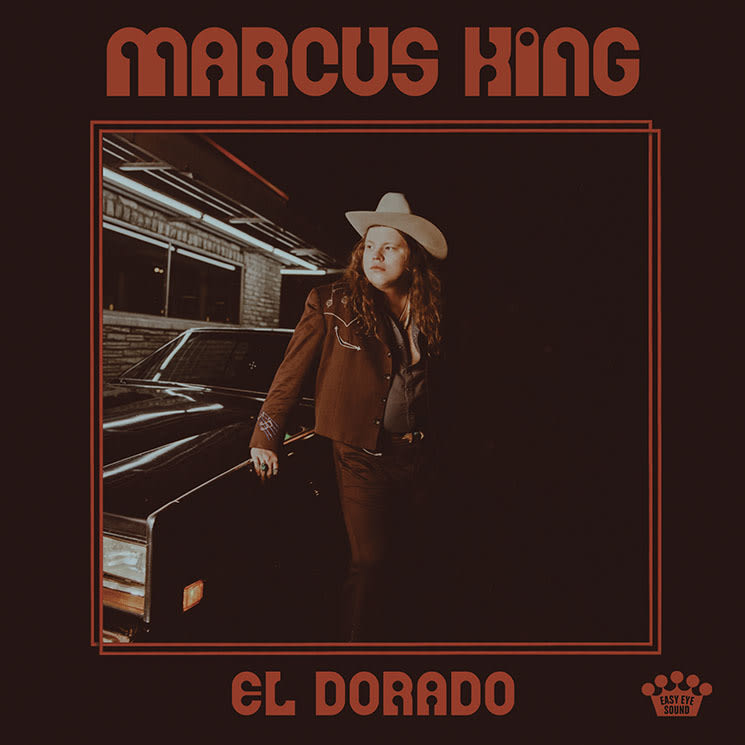Marcus King searches for the lost city, and a new identity, on his solo debut, El Dorado.
The 23-year-old has been renowned as a blues prodigy, packing face-melting solos and dizzying pentatonic runs into previous records with his band. But El Dorado is a far cry from the flurries of notes the young bluesman is known for — there's a conscious effort by King to bring his lyricism into the forefront, and letting the guitar take a backseat for most of these 12 tracks.
The result is more folk, less flash, but still a generous helping of the blues — like on the opener "Young Man's Dream," which carries an undeniable Neil Young influence through its acoustic chords and swelling embellishments.
King's exploration continues on "Wildflowers & Wine," driven by a walking bass with staccato guitars sprinkled sparingly behind gospel choruses. It's soulful and intimate, with some of King's strongest singing on the entire record.
On "Break," King sweetly croons over warm keyboards between gorgeous piano lines. The raspy falsetto on the refrain of "don't let your heart break for nobody but me" is probably El Dorado's strongest claim for King's balladeer reinvention.
But that goes out the window on the very next cut, "Say You Will," where King launches into a bombastic blues riff, eventually giving way to a fiery solo that would sound at home on a Cream record. It's the only real indulgence King allows himself on El Dorado, but it's tasty enough to keep you satisfied for the remaining four songs.
The entire album bares a soulful Nashville-charm, courtesy of the veteran hands of Black Keys frontman Dan Auerbach — who not only serves as El Dorado's producer, but co-writer as well. The 12 songs were finished off with recording at Auerbach's Easy Eye Sound Studios, alongside his band of legendary session players, who have backed everyone from Willie Nelson to Elvis Presley. There's a warmth to El Dorado that's evident through even the most sterile computer speakers, a vintage, analogue quality that fits the songwriting across the record.
Despite the glaring transition on El Dorado, there's no identity crisis to be found — King is just as commanding as a crooner as he is with his guitar wailing through a cranked-up amplifier. It's unclear where King will go next, or how much of Auerbach's influence directed the sound of El Dorado, but King certainly has the versatility to make any shift worth listening to.
(Fantasy)The 23-year-old has been renowned as a blues prodigy, packing face-melting solos and dizzying pentatonic runs into previous records with his band. But El Dorado is a far cry from the flurries of notes the young bluesman is known for — there's a conscious effort by King to bring his lyricism into the forefront, and letting the guitar take a backseat for most of these 12 tracks.
The result is more folk, less flash, but still a generous helping of the blues — like on the opener "Young Man's Dream," which carries an undeniable Neil Young influence through its acoustic chords and swelling embellishments.
King's exploration continues on "Wildflowers & Wine," driven by a walking bass with staccato guitars sprinkled sparingly behind gospel choruses. It's soulful and intimate, with some of King's strongest singing on the entire record.
On "Break," King sweetly croons over warm keyboards between gorgeous piano lines. The raspy falsetto on the refrain of "don't let your heart break for nobody but me" is probably El Dorado's strongest claim for King's balladeer reinvention.
But that goes out the window on the very next cut, "Say You Will," where King launches into a bombastic blues riff, eventually giving way to a fiery solo that would sound at home on a Cream record. It's the only real indulgence King allows himself on El Dorado, but it's tasty enough to keep you satisfied for the remaining four songs.
The entire album bares a soulful Nashville-charm, courtesy of the veteran hands of Black Keys frontman Dan Auerbach — who not only serves as El Dorado's producer, but co-writer as well. The 12 songs were finished off with recording at Auerbach's Easy Eye Sound Studios, alongside his band of legendary session players, who have backed everyone from Willie Nelson to Elvis Presley. There's a warmth to El Dorado that's evident through even the most sterile computer speakers, a vintage, analogue quality that fits the songwriting across the record.
Despite the glaring transition on El Dorado, there's no identity crisis to be found — King is just as commanding as a crooner as he is with his guitar wailing through a cranked-up amplifier. It's unclear where King will go next, or how much of Auerbach's influence directed the sound of El Dorado, but King certainly has the versatility to make any shift worth listening to.
